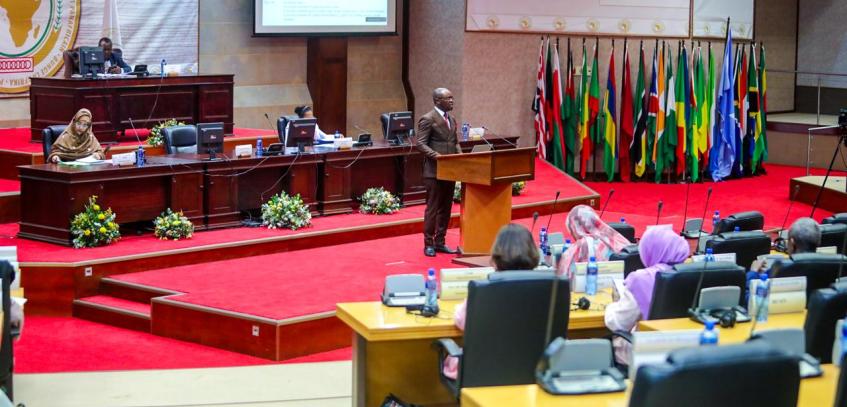The African Peer Review Mechanism (APRM) has expressed its strong confidence in the Pan-African Parliament's ability to advocate and create awareness about the work of the Mechanism in promoting good governance, transparency and accountability.
APRM presented the Report to the Plenary Session of the 3rd Ordinary Session of the Sixth Pan-African Parliament held in Midrand, South Africa, on 3 July. The Report, presented by Mr. Germain Miteu Tshinu, the Regional Coordinator at APRM, aligns with the African Union (AU) theme for 2024: "Educate an African Fit for the 21st Century: Building Resilient Education Systems for Increased Access to Inclusive, Lifelong, Quality, and Relevant Learning in Africa."
Launched on 9 March 2003 by member states of the African Union in Abuja, Nigeria, APRM is a self-monitoring instrument. It is an African-owned and African-led platform for self-assessment, peer-learning, and experience-sharing, aimed at promoting democratic governance, high economic growth, sustainable development, and accelerated regional and continental economic integration.
In its recently released report to the Pan-African Parliament, APRM emphasized the crucial role of Parliamentarians in influencing national government decisions and policies. By passing legislation, mobilizing support for the APRM process, and participating in sensitization, Parliamentarians can revive political debate on APRM findings.
The Report expressed confidence that the Pan-African Parliament will fulfill its mandate of implementing the National Programme of Action in APRM member states. It also believes that MPs' involvement can enhance the mechanism’s impact by ensuring that its outcomes lead to concrete actions and improvements in governance across the African continent.
Mr. Tshinu presented a comprehensive overview of the Report and discussed the role the Pan-African Parliament can play in ensuring that the recommendations are implemented. The Report highlighted the efforts of South Africa and Namibia in expanding and improving their education systems. It also acknowledged the positive impact these states have made in providing quality education while offering recommendations for further improvement.
The APRM Base Document specifies that six months after the Country Review Report has been considered by the Heads of State and Government of the participating countries, the Report must be formally and publicly tabled in key regional and sub-regional structures, including the Pan-African Parliament, the African Commission for Human and People’s Rights, the Economic, Social and Cultural Council (ECOSOCC), and other sister organizations.
The Report stressed the importance of continued partnership between Parliaments and APRM to foster respect for the rule of law and create a conducive environment for stability, sustainable economic and social development based on good governance. Parliamentarians welcomed the Report and provided suggestions for APRM’s future studies. They emphasized the need for accurate statistics and called for APRM to engage more with grassroots communities to raise awareness about their work and inform the public about the findings and areas for improvement in their countries.
Hon. Danson Mungatana underscored the importance of ensuring representativity in the review process. “The mission comes to the country and meets with top officials, but they must engage with ordinary people,” Mungatana said. “Those are the people we need to engage with and let them know what their sister or brother countries are saying about their country pertaining to development.”
Mr. Tshinu welcomed the suggestions from the Parliamentarians and added that as more countries join the reviews, APRM will ensure that they gather accurate information from a broader range of provinces and communities.
-Ends-








